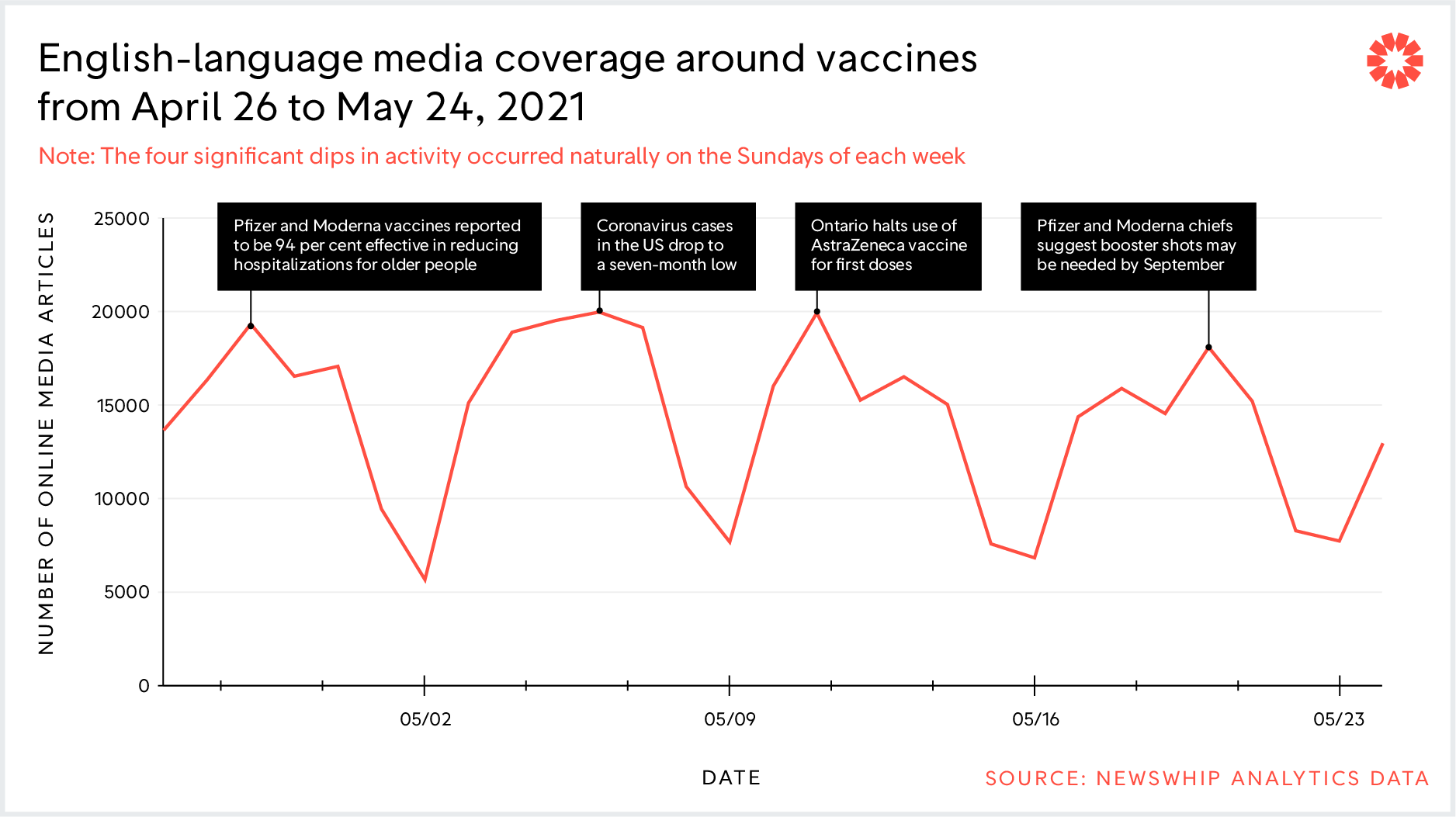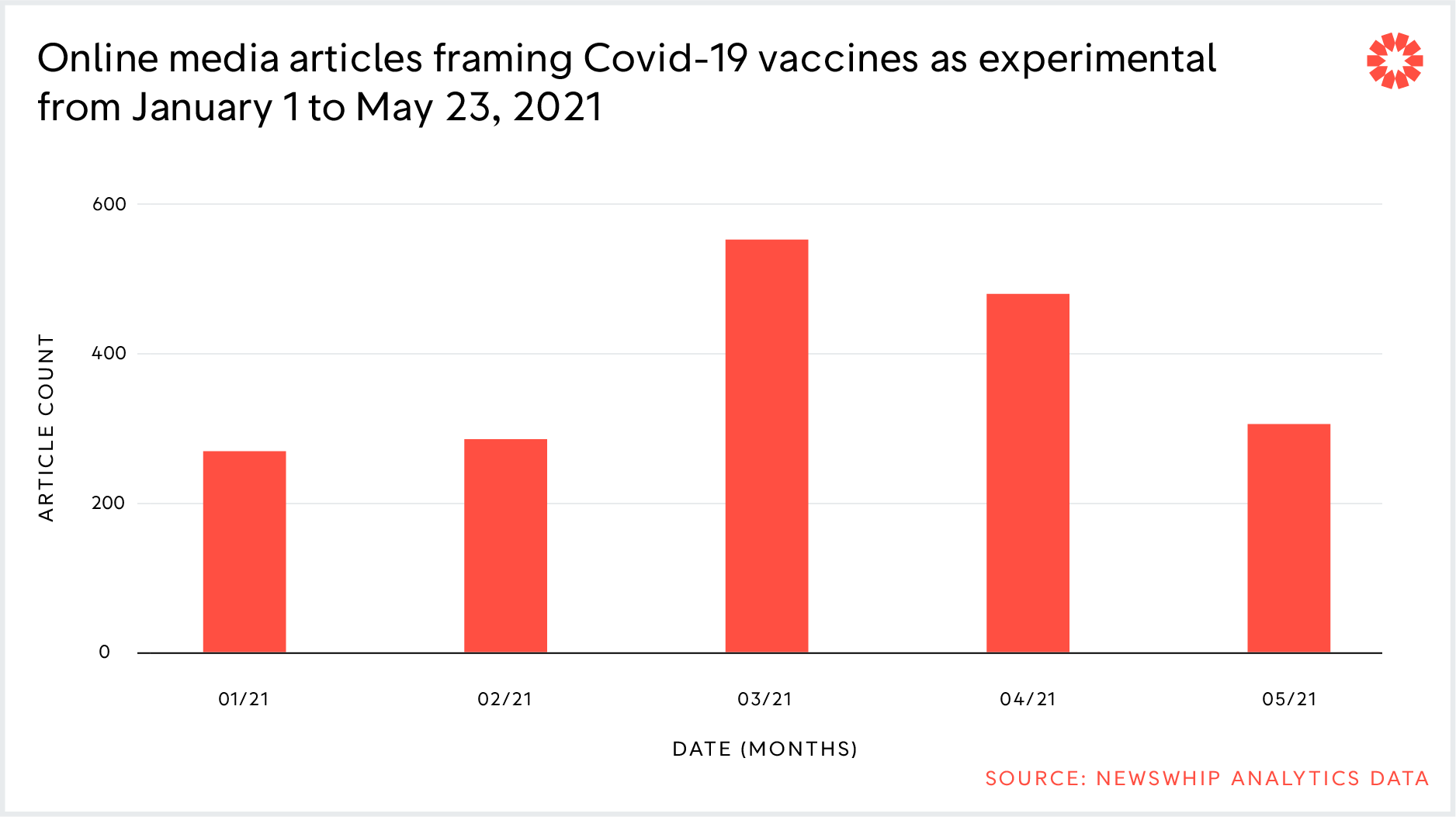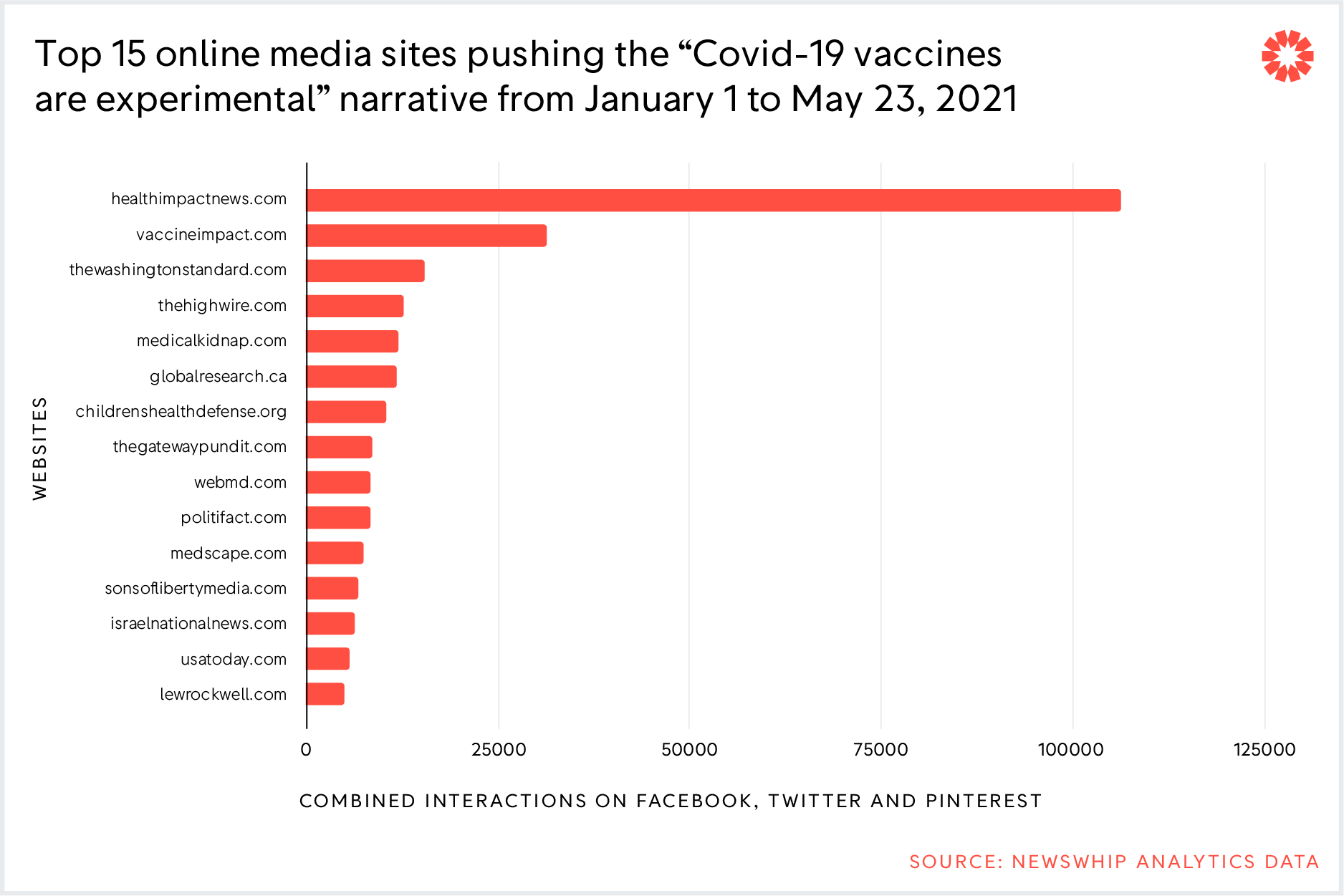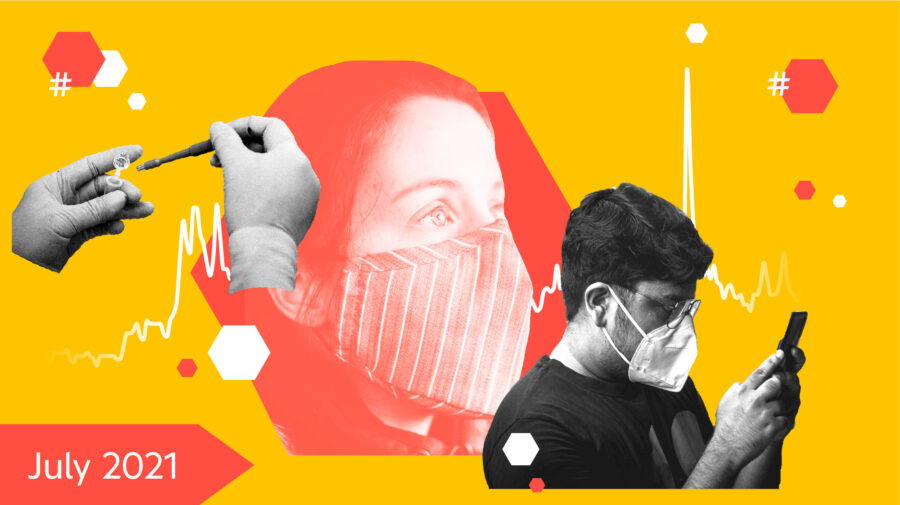This is the second installment of a four-part insights report series, published at the start of each month, that provides a summary of the key trends and insights on information disorder related to vaccines over the past 30 days. As First Draft continues to monitor Covid-19 vaccine misinformation around the world, these reports are designed to highlight the most relevant media trends, narratives, emerging threats and data points we identify.
Media Trends
Over the course of May, English-language media coverage of vaccines was dominated by the US Food and Drug Administration’s decision to extend use of the Pfizer vaccine to young adolescents, along with the Centers for Disease Control and Prevention’s updated guidance on mask-wearing for fully vaccinated people.
The CDC’s new recommendations on mask-wearing resulted in considerable confusion and, to a lesser extent, fringe conspiratorial narratives that framed the rules as being part of a wider plan to implement “health passports.” The FDA’s approval of the Pfizer vaccine for 12- to 15-year-olds sparked widespread online criticism on moral and ethical grounds. Many online anti-vaccine sources cited the news to claim that governments are attempting to subject children to an unsafe Covid-19 vaccine “mass experiment.”
The three other most common topics were the Biden administration’s intention to back a vaccine patent waiver to reduce global inequalities, South Carolina’s ban on “vaccine passports” and the continued decline in new Covid-19 cases and deaths in the US.

The New York Times story “Reaching ‘Herd Immunity’ Is Unlikely in the U.S., Experts Now Believe” was the most engaged-with article on social media, according to NewsWhip data. Much of this engagement came in the form of calls from pro-vaccine communities for people to get vaccinated. However, others referred to the article to argue that the “vaccine silver-bullet” narrative — the idea that vaccines would single-handedly guarantee a swift return to normalcy — is flawed and unrealistic.
The news that a school in Miami had instructed vaccinated teachers to stay away from children also spread widely on social media. The school’s co-founder, Leila Centner, justified her decision by citing false claims that included the idea that women’s menstrual cycles can be affected by close contact with vaccinated individuals (see the Vaccine Narratives section below).
Articles reporting on the pause of the AstraZeneca vaccine rollout in Ontario, Canada — which generated more than 40,000 interactions each across Facebook and Twitter — were used by North American anti-vaccine online sources to amplify the false narrative that Covid-19 vaccines are experimental and unsafe.
Vaccine Narratives
The Covid-19 vaccine rollout is an immoral mass experiment
Ever since the US and UK Covid-19 vaccine rollouts began in December, the idea that these vaccines are experimental and unsafe has been one of the most pervasive anti-vaccine narratives on English-language social media. The centrality of this narrative within many online conversations can be explained, in part, by its ability to use any vaccine safety-related claim, rumor or even genuine concern as extra ammunition.
Initially, the “experimental” narrative was bolstered by the fact that the Pfizer and Moderna vaccines used the novel mRNA technology. But since the AstraZeneca shot came to the forefront of the news cycle, some online media sites pushing the narrative began labeling “adenovirus” vaccines — such as the AstraZeneca vaccine — as “experimental.”
The narrative also serves to feed more far-reaching conspiracy theories that Covid-19 immunization campaigns are part of a concerted effort by global elites to conduct a mass human genetic modification experiment. The experimental narrative’s natural implication that vaccine recipients are “guinea pigs” is also the basis for several morality-themed anti-vaccine narratives.
And off the back of the news that the FDA had extended Pfizer’s emergency-use authorization to young adolescents, many online anti-vaccination sources have framed this decision as a cynical and immoral use of children as vaccine guinea pigs.
Covid-19 vaccine causes infertility, miscarriage or menstrual issues via ‘vaccine shedding’
Since the rollout of Covid-19 vaccines, false claims and narratives associating vaccinations with female infertility have circulated online. These claims have recently been bolstered by the idea of “vaccine shedding,” which claims that being exposed to vaccinated people can cause a range of fertility issues in unvaccinated women.
Despite being roundly debunked by medical experts, the narrative has spread rapidly, amplified in large part by anti-science websites and disinformation superspreaders. The false claim has already caused a handful of real-world incidents. In Canada, several businesses banned vaccinated people from entering, in order to “protect women.” And in Miami, a private school instructed immunized teachers to stay away from students, fearing that people could experience “menstrual irregularities” and other reproductive harm simply by interacting with vaccinated people.
Social media platforms such as Facebook and Instagram have removed many posts pushing the idea of “vaccine shedding” causing infertility. However, on fringe platforms such as BitChute, there are hundreds of videos pushing this false narrative that have garnered hundreds of thousands of views.
New coronavirus ‘variants’ are a lucrative excuse to justify perpetual vaccinations
Last month, suggestions from Pfizer CEO Albert Bourla that a booster shot may be needed triggered a wave of anti-vaccine narratives that centered on financial motives. These narratives revolve around the idea that booster shots will be used as a ploy by pharmaceutical companies to continue to profit from the pandemic.
And in light of the increasingly frequent emergence of variants, some of which experts fear might be able to evade vaccines, Dr. Anthony Fauci, chief medical adviser to US President Joe Biden, as well as several other medical experts have now also suggested that booster shots may soon become necessary. Meanwhile, Moderna has begun clinical trials for a variant-specific booster shot. These developments have fueled claims that variants will serve as an excuse for governments and health authorities to prescribe additional booster shots and in turn guarantee continued profits for pharmaceutical companies.
The insidiousness of this narrative has been exacerbated by reports that nine new billionaires have emerged from the development and provision of Covid-19 vaccines. Many lead major vaccine manufacturing companies. The ongoing lack of transparency over the ability of manufacturers to raise vaccine prices in the future could also enable the narrative’s popularity to grow.
Emerging threats and data deficits
Data deficits are where high levels of demand for information about a topic are not adequately matched by a supply of credible information. Where data deficits exist, rumors, speculation and misinformation are more likely to spread. Countering data deficits requires healthcare providers and institutions to engage in pre-emptive research that can inform proactive messaging related to these data deficits, such as “pre-bunks” and explainer pieces.
Variants and the effectiveness of vaccines
As more coronavirus variants emerge, questions over whether current vaccines will be effective against them are naturally arising. But over the last month, conflicting reports regarding the ability of certain variants to evade vaccines have pervaded the information space. For example, preliminary studies had previously indicated that the Pfizer and AstraZeneca shots were significantly less effective against the variants first detected in South Africa and Brazil. In contrast, Hans Kluge, the World Health Organization’s European regional director, recently stated that the current crop of Covid-19 vaccines seems to be effective against all of the newly identified variants of concern, including the B.1.617 variant first detected in India.
Such contradictory information has heightened vaccine skepticism and confusion, and could bolster narratives that suggest variants will be used as an excuse to justify the need for additional booster shots.
Vaccine contract renewals
With current vaccine contracts set to expire and a new generation of Covid-19 vaccines on the way, governments will have to decide whether to exercise renewal clauses. A plethora of financial, logistical and technical considerations will inform these decisions. But a decision not to renew a contract could be framed by anti-vaccine sources as “proof” that the vaccines aren’t safe and effective.
Decontextualized headlines that do not specify the reasons behind these decisions may become increasingly weaponized by anti-vaccine sources online.
Reports that the European Union will not renew its contracts with AstraZeneca and Johnson & Johnson have already been used to push claims that these vaccines are unsafe and ineffective.
Vaccines ‘linked’ to emergence of variants
The idea that Covid-19 vaccines are resulting in new strains of the virus has recently taken root on social media. The idea was inspired by unsubstantiated claims from Luc Montagnier — a French Nobel laureate and virologist known recently for his endorsement of homeopathy — who said in an interview that “the [Covid-19] variants come from vaccinations.” Fringe disinformation websites, such as Health Impact News and Rise Align Ignite Reclaim, published articles amplifying this false narrative, which has spread across French-, English-, Portuguese- and Spanish-speaking social media. Montagnier was also falsely attributed as saying that Covid-19 vaccines cause Antibody-Dependent Enhancement (ADE) — a condition that occurs when the body produces antibodies that actually enhance the disease — which will result in the deaths of all vaccinated people in the next two years.
This isn’t the first time that such claims have arisen around a vaccine. Similar false assertions were used to sow chaos and erode trust in vaccine campaigns across Africa and in the Philippines. Anti-vaccine activists and pro-Russian sites decontextualized and reframed an AP article published in September 2020 to suggest that the UN was “forced to admit” that vaccines financed by Bill Gates caused the spread of polio across Africa. And in the Philippines, contentious claims linking the Dengvaxia vaccine to ADE contributed to an information vacuum that was quickly filled with speculation and misinformation. The upshot was a significant uptick in vaccine hesitancy across the country.
The resurrection of these claims by anti-vaccine activists and disinformation websites as they relate to Covid-19 vaccines is worrisome. They further entrench pre-existing narratives challenging the effectiveness and safety of vaccines and, as a result, have the potential to discourage fence-sitters from getting vaccinated.
In focus: The disinformation networks driving the ‘experimental’ vaccine narrative
During the early stages of the race to develop a Covid-19 vaccine, some media outlets referred to vaccines — that were, at the time, candidates going through the first round of clinical trials — as “experimental.” But once several Covid-19 vaccines had been approved for emergency use by multiple regulatory authorities at the end of last year, disinformation actors co-opted this language. They described Covid-19 vaccines, particularly Pfizer and Moderna’s mRNA-based shots, as “experimental” to suggest that they were unsafe and that their recipients would be serving as guinea pigs.
And as the global Covid-19 vaccine rollout gathered pace, so too did the spread of online articles framing it as a risky experiment.

The number of online articles framing Covid-19 vaccines as “experimental” peaked in March 2021, when multiple countries decided to pause administration of the AstraZeneca vaccine over reports of extremely rare blood-clotting disorders. These concerns, as well as more recent unfounded safety-related claims — including female infertility — have been weaponized by disinformation actors who frame them as a predictable outcome of this “vaccine experiment.”
A closer look at the sources pushing this narrative most successfully reveals the outsized role played by websites that are part of well-known North American anti-science and pro-Russian networks.

Health Impact News, Vaccine Impact and Medical Kidnap, which respectively generated the first, second- and fifth-most combined social interactions from articles framing Covid-19 vaccines as “experimental,” are affiliated. The network is a small US-based anti-science conspiracy theory group whose content and audience closely resemble that of the infamous Natural News disinformation network. In fact, these networks regularly syndicate and recycle one another’s content. Vaccine Impact and Medical Kidnap, as well as two additional websites that are part of the same network, are mirror sites. They have the same appearance as the main Health Impact News website and largely host identical content, but simply use innocuous-sounding domain names.

Canada-based disinformation website Global Research generated the sixth- most interactions for articles containing the words “vaccine” and “experimental.” Global Research is described by the US State Department’s Global Engagement Center as “deeply enmeshed in Russia’s broader disinformation and propaganda ecosystem.” It also frequently amplifies content from sources believed to be directly controlled by the Russian foreign intelligence service, such as New Eastern Outlook. Many of these Global Research articles have exclusively targeted the Pfizer vaccine.
Other key peddlers of the “experimental” narrative include High Wire and Children’s Health Defense. These are headed by anti-vaccine influencers Del Bigtree and Robert Kennedy Jr., a nephew of John F. Kennedy, respectively.
The success of these disinformation actors in pushing the “experimental” narrative on major social media networks comes despite the fact that their social media assets — including Facebook Pages and Twitter accounts — have been taken down. This points to the limitations of platforms’ counter-disinformation policies when it comes to curbing the reach of known disinformation networks.
PolitiFact, which appears as a false positive in this analysis because of its debunking of the claim that Covid-19 vaccines are “experimental,” comes in far behind the other websites in terms of reach and engagement. This serves to highlight yet again how fact checks struggle to compete with disinformation on major social media networks.






